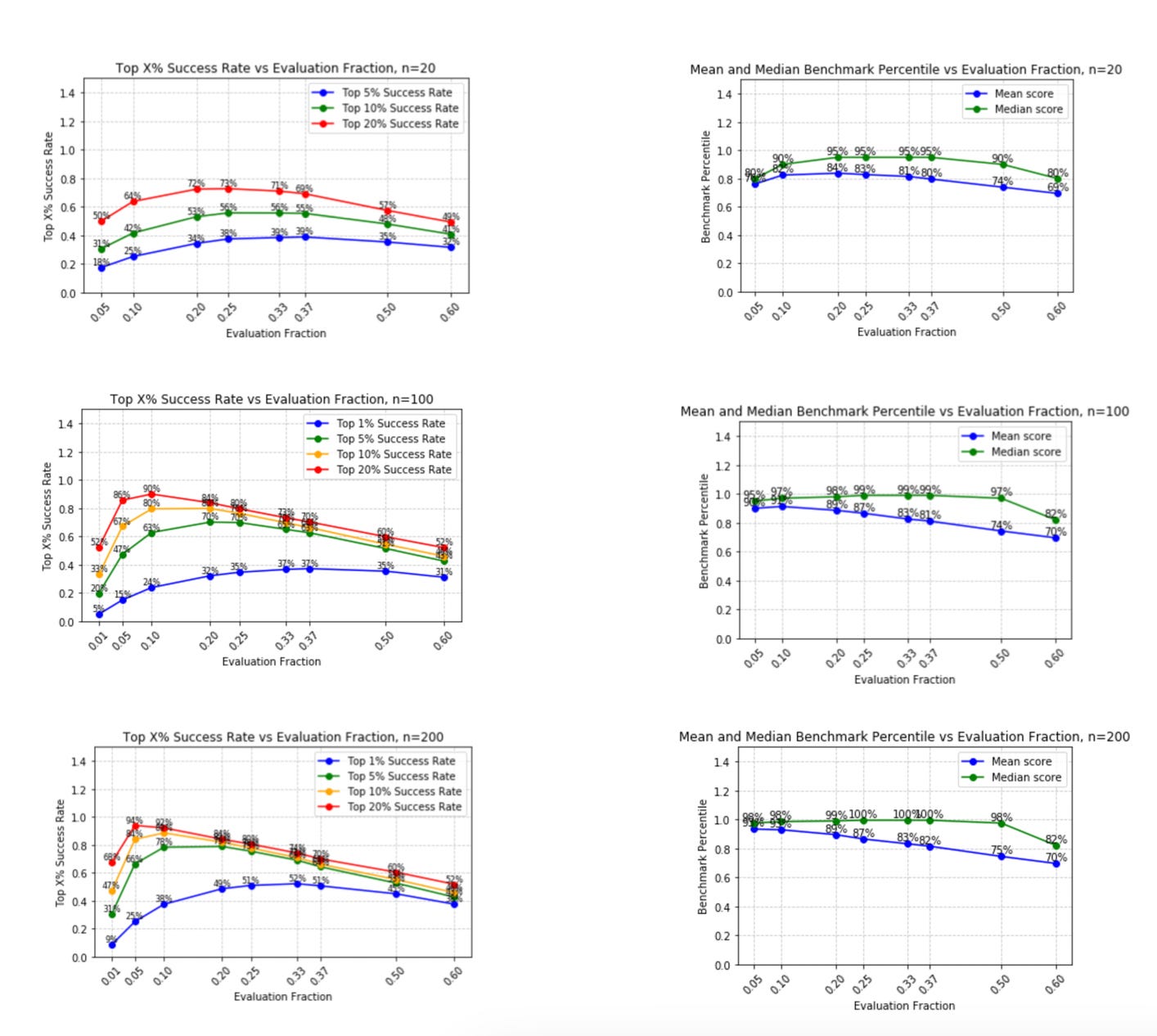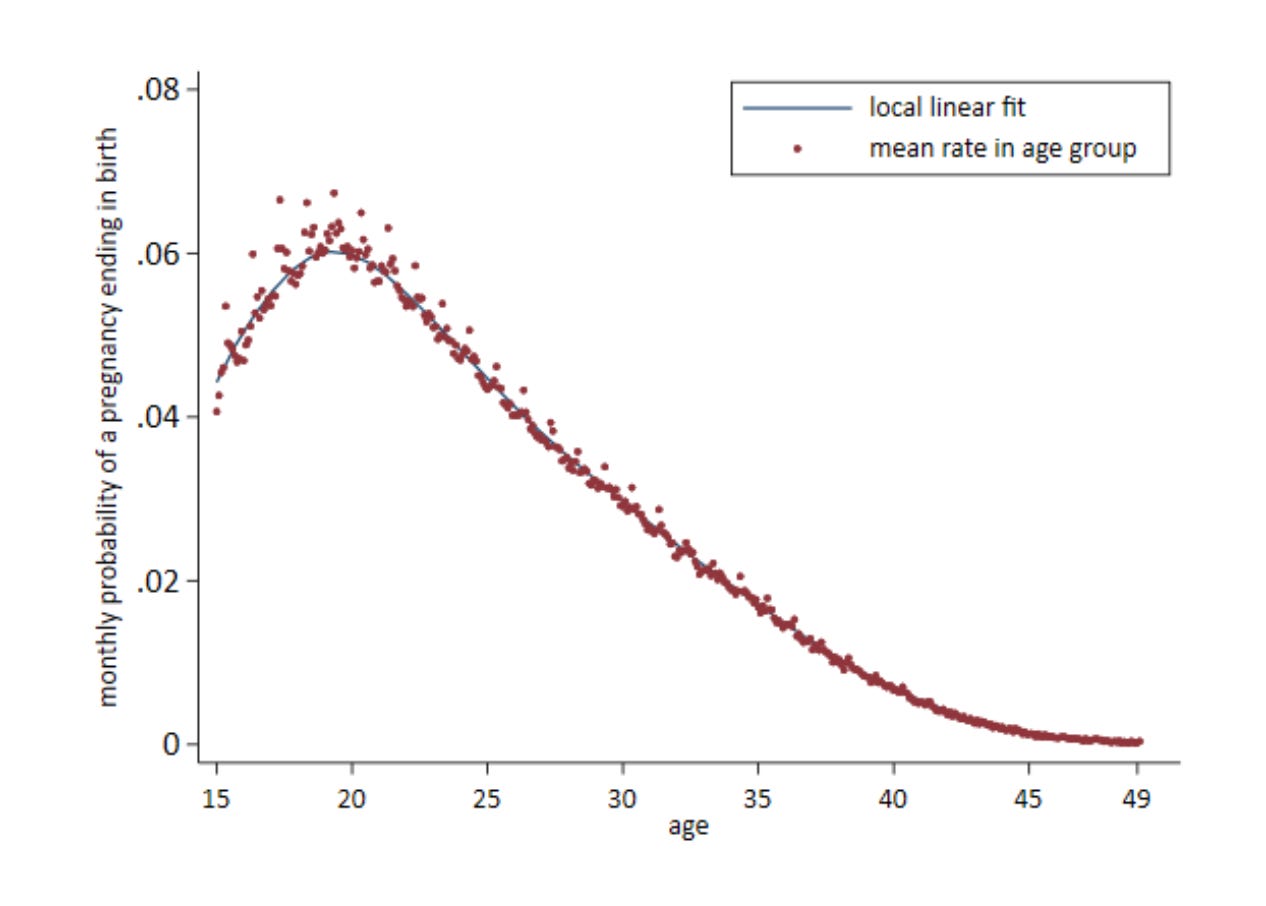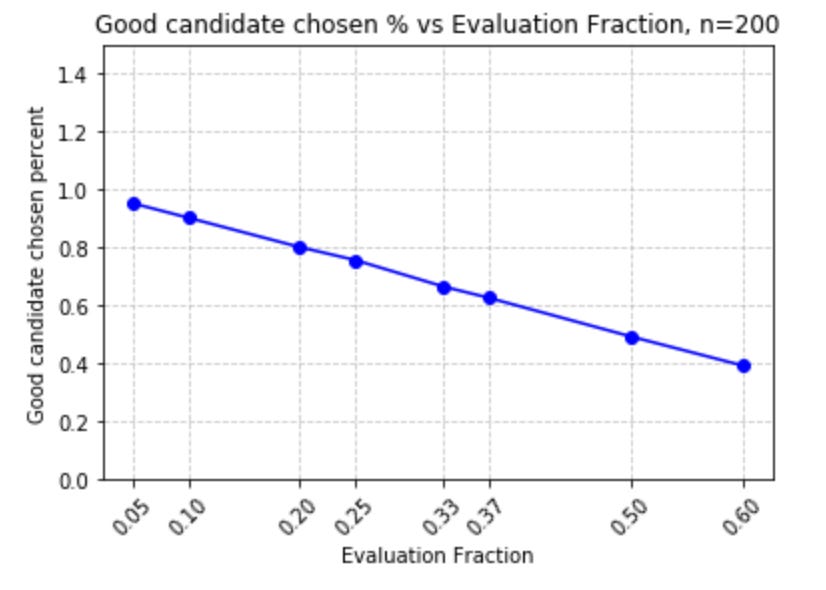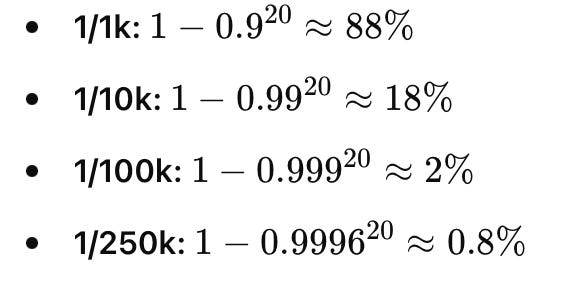You only get 3 things in mate optimization
The harsh truths of limited search capacity and luck
Background and context
I’m “good” at dating, in the sense that various people have asked my advice several times, and in the sense I’ve dated waaaayyyy too many women in my life.
But no matter HOW great you are - how ripped, how rich, how attractive, how smart, how fun, how high status, you only get 3 attributes that you can optimize on. It seems unfair - only 3 things?? But I bring more than 3 good things to the table! Yeah, reality is a harsh mistress. In general, it’s impossible to find somebody who matches you, and the cooler you are on multiple fronts, the less you’re gonna be able to match - you only get 3 things, period.
In this post, I hope to show you the practical and theoretical reasons this is true.
What everyone wants
So basically, everyone wants a smart, hot, empathetic and nice, sexually compatible, fit, conscientious Ivy grad from a great family, right?
I mean, if you could dial it in. Or if your parents could have dialed it in for you, and so on. Maybe you wouldn’t choose these EXACT things, but you’d be choosing a bunch of “good things,” pretty close to this, and cranking the dial to eleven on every single one of them.
But most of us are human, and those people are 1/250k at the most generous, so mostly we have to settle for less.
Logistics limits you
Then there’s the raw logistics of finding and evaluating candidates. Dating takes time. Sooooo much time! It’s just…a furnace, straight immolating time that would be better spent on practically anything else! I think I usually average 6-10 hours a week when I’m single. Even if you’re paying for matchmaking or app management on your behalf, or - horrors, approaching in person - it still eats at least 4-6 hours a week just on dates!
And the median experience is not liking the person and pretty much immediately knowing they’re not a good long-term choice! Dating is awful all around, because it’s the only actually important thing that has a 90%+ failure rate. Everyone hates it, to a first approximation.
Even if there’s zero friction and it’s really easy for you to get in-person dates, you only have so much time to dedicate to it. And in-person dates are necessary to know whether you have chemistry. Not just that, it takes time to really get to know each other - sure, you can eliminate lots of people at the swiping, chatting, or first date stages, but true compatibility goes a lot deeper and requires several dates, and probably a couple thousand words exchanged (and for many people, having sex several times) to really evaluate compatibility.1
Given that being in a relationship is better than being single, and given that we have limited evaluation time and biological clocks, there’s a raw limit on the number of candidates and the amount of time anybody can spend evaluating potential mates.
Theoretical bracketing
Mathematically, this is a well formalized problem - it’s called “optimal stopping” or the Secretary Problem. Given N candidates, how many should you evaluate to maximized your chances of getting the best candidate?
The analytical answer is 37% of N, to maximize your chances of finding the best candidate.
So I’ll suggest based on empirics and a realistic dating time that the “evaluable range,” or “total potential mate pool” for most reasonable people is probably between 20-200 potential spouses. This boils down to evaluating 7-74 people, then deciding on the next one to impress you relative to that pool.
But we can do a little better!
The analytical Secretary Problem is over-indexed on finding the literal “best” candidate, but I think we know that’s a pipe dream (it also only has a ~37% success rate). So if you explore the parameters of the space with Monte Carlo simulation, you find some interesting things:

Broadly, the more candidates you have, the better off you are stopping earlier. A top 5% or better candidate is maximized at ~20% evaluated and 100-200 candidates (20-40 total evaluated), and if you were fine with a top 10% candidate, you’re fine stopping at 10% evaluated (10-20 total evaluated).
You can also see your “mean” candidate is pretty high at 10-20% evaluated, even if your total potential mate pool is only 20.
In other words, evaluating ~37% of your candidates, the formal analytical answer for the Secretary Problem, has overindexed on finding the literal best candidate, and comes at the expense of having to evaluate a lot more candidates, as well as costing you more top 5% candidates without really moving the needle all that much in terms of getting you a top 1% or the literal “best” candidate.
PLUS, if you go too far into your evaluation pool, you end up not being able to find somebody better than the evaluation pool more often, topping out at choosing a non-optimal (ie essentially random) candidate ~61% of the time at a 60% evaluation fraction:
Once again, we see that “always settling” is the correct answer, and you should sastisfice and aim to evaluate between 4 and 20 candidates, which will be between 10-20% of your pool, then choose, and that you’ll end up with a fairly high mean and median candidate, and do pretty well on your chances of a top 1-5% candidate that way WHILE saving yourself a bunch of time.
Rarity, selection, and reductionism
One thing you’ll immediately notice - even with the most stringent swipe and messaging filter meaning you only ever evaluate the top 1% of candidates, “evaluating 4-20 people” tops you out at a 1/100 - 1/10k candidate. This means the 1/250k nice Ivy grad is unattainable without a lot of luck, so we likely need to set our sights lower.
Another potential issue - it feels pretty reductive to summarize somebody’s entire “mate score” into a single ordinal number that you can use to rank everybody against each other. Isn’t everyone a unique collection of ups, downs, and even sidewayses, as rare and precious as any individual flower or snowflake?
Good news! If you feel this way, just go out on the street and randomly choose the first woman you see and marry her. Surely you’ll be happy, as every single one is a unique and precious flower / snowflake, right?
But if you have some misgivings about doing that, and think quality actually matters, I think it helps to just take things very seat-of-the-pants and high level. Trying to get pedantic about not being able to rank people by quality is hurting you much more than helping - obviously quality exists in the world, and some mates are better than others, both in the short and the long term.
Don’t get too analytical about the overall score, don’t think about specific aspects, just think on a broad, overall 1-10 scale. “Well, my last ex was roughly a 6/10, and the best one before her was a 7/10, so if I see a 7.5 or better, that’s probably realistically the best I can do and I should lock it down.”
Everyone is doomed to settle
Yet another problem with this whole schema - say you’ve evaluated your 20 people or whatever. Now everyone always sucks on SOME measure! Because there was always somebody prettier, or nicer, or better in bed, or smarter, or whatever. Settling is mandatory, and you’ll have always had “better” on some important measure.
And most of those metrics are independent. Smarts and looks and niceness and being good in bed? Not very correlated with each other. Some of them might even be anti-correlated! And back to our napkin math, a “top 10% on some metric” candidate - which is a good lower bound for a “noticeably good in this department” standard -across 3 relatively uncorrelated metrics, tops out at 1/1k. Given our previous analytical bounds of 1/100 - 1/10k, this is a solid midpoint of what you can realistically expect, and even this requires some luck.
Bringing it all together
And so, after a lot of empirics on this front (once I decided to literally do “optimal stopping” and dated ~150 women over about a year and a half, trying to get out into those decimal places), and the theoretical limits I’ve just outlined, we have arrived at the “you only get 3 things” heuristic!
3 things is about the most you can optimize, and still have a reasonable chance of deciding on a candidate in a reasonable amount of time and dates, and is about the best you can do theoretically too.
It seems unfair. “Only 3 things?? But *I* bring more than 3 good things to the table!” I hear ya. It’s terrible! Monstrous! Untenable! But ultimately realistic, I fear.
Because one thing you’ll notice, and as I mentioned before - even if you can filter to only the top 1%-or-better of potential partners by app and messaging criteria before going on dates (and I don’t think you can discern much farther than “1% or better” even over conversation, because so much actually important and largely illegible information is left out via textual communication), you still require a lot of luck to lock down a really top tier candidate.
Even if you know your pool is at least 1% or better, if you’re only evaluating 20, and traits are relatively independent, it requires a good bit of luck to do better than a 1/1k to 1/10k candidate. So even if you yourself are a 1/10k or 1/100k candidate, or god help you, even better than that - good luck! Here’s your rough odds:
You’ll notice you have an 88% chance for the “top 10% on 3 things” 1/1k candidate. Any better requires either “good” or “phenomenal” luck.
Hence, only 3 things, no matter how cool you are.
And what are those 3 things?
That’s up to you!
After all, people WANT an endless array of “goods” in their partners: Looks, age, niceness, empathy, good mom / dad, smarts, conscientiousness, discipline, athleticism, personality, humor, sexual compatibility, Ivy degrees, familial attainment. It’s literally endless.
The HARD part is only choosing 3 of them!
A brief note on kids and fertility
If you want kids though, I urge you to seriously consider “age” as one of your criteria, because of this female fertility graph:

Look at the absolutely massive delta between early 20’s, and 30 or 35. That’s literally a difference between “30% chance of a baby" at age 30 (and ~22% at 35), and “60% chance” at age 20! I’ve written more about that, including risk of birth defects and miscarriage by age, here if you’re interested.
Why are you bringing this up?
It’s time dependent! If you’re a man under 30 and you know you want kids already, you’re already dating girls in their twenties, and you don’t have to burn a card on “age,” which is a *really* huge deal - I mean, that’s literally multiplying the good things you can get by 1.5! If you’re in these happy circumstances, I urge you for, the love of god, date 4-20 people, then lock somebody down and pop some babies out, because you’ll prospectively be 1.5x better off than you would be if you’re dumb enough to wait until you’re older, like myself (because I’m old enough I have to burn one of my optimization cards on “age” now.)
Another reason?
Lots of people suck at dating (because it's genuinely hard) or lack self-knowledge, or knowledge of these overall limitations, leaving them poorly calibrated about what an achievable great mate would be. They haven’t decided on the things actually important to them, and just have a vaguely hopeful, non-prioritized mismash of desirable things in their heads as they go about dating.
This is an arbitrage opportunity.
You can do better!
Because people are vague and hopeful, and because the median experience for high status people of both genders is “well, there’s ten thousand other hotties waiting for me in the app, so unless somebody really blows my socks off, I’ll just take things as they come,” the median dater is acting vastly suboptimally.
They are too slow to evaluate and decide, and too slow to lock down a good candidate, or they’re so beaten down that they simply take the next person that isn’t awful. All this, just because they’re fed up and don't want to spend any more time on dating. But if YOU go in with a plan, with the three attributes that are actually most important to you, with a willingness to settle on the other attributes, you’ve outcomputed the lazy, and you get an edge.
And an edge here? In the impossibly competitive arena of mate selection and parent-to-future-children? It’s literally one of the most important areas of life entire! The quality of your mate pretty much dictates the quality of your daily life for the next who-knows-how-many years! It also dictates the quality of any kids you have! It’s mind-bendingly important to do the best you can, and being able to identify and act on any arbitrage opportunity here is a big deal.
Now when you spot a great mate that affirmatively performs on your 3 things, it affords you the opportunity to invest more time and attention, to pursue harder, and to commit earlier than anybody else.
So let this be a reminder to take a realistic look at what you actually want, and get out there, because this one matters.
Wrap up
So if you only get 3 things, what does that mean?
It means you need to decide where you are okay compromising and having “average or worse.” Because none of us WANT “average or worse,” on any attribute! But hopefully I’ve convinced you that you actually do need to settle, and only getting 3 things is a pretty strong heuristic both practically and theoretically.
So where are you actually willing to take a hit? Looks? Smarts? Conscientiousness? Age / Fertility? Education? Niceness? Familial attainment? Sexual compatibility? Being a good parent? You’re gonna have to be willing to tank more than half of those, on average! Which ones really matter? Because only you can decide this.
But the flip side of this whole thing is that you can have a person who’s roughly top 10% - “noticeably great” - on at least 3 of those measures! And that’s pretty exciting!
So decide which 3 you want to optimize, and get out there and settle!
And it’s not like it would be useful even if apps gave you more info. Even in the halcyon days of Old Okcupid, where people wrote long profiles and answered lots of questions, all that info was merely suggestive, rather than dispositive.
This has been verified in *countless* studies - the things people say they want in a mate just literally doesn’t matter at all, more or less. All you can do is get roughly-status-and-looks matched people to go on dates and see what happens.
From Gwern:
“To summarize: everyone agrees on who's hot or not, and it is better to be hot than not; past that degree of assortative mating, predicting pairwise success of romance appears to be essentially impossible.
I'm particularly impressed by Joel et al 2017, where participants spent half an hour filling out several hundred of the most useful survey/psych questions (many extremely similar to what 'date documents' record) first, and past the global 'hot or not' ratings everyone could agree on, they throw high-powered random forests at trying to predict pairs of men/women, and the pairwise random forests do not merely fail to add much predictive power, they actually make the predictions worse! I, uh, did not predict that.
If you can take hundreds of participants filling out hundreds of tailored survey items about all their preferences and ideals and desired traits of romantic partners, and our highest-powered statistical methods identify less than zero signal, and this is also consistent with other analyses like asking whether your preferences predict satisfaction with partners (apparently not!), then I cannot see any reason for optimism about 'dealbreakers' existing and being so important you should structure all dating based on it. They would appear to be highly negotiable; perhaps true dealbreakers exist only in retrospect (such as at workshops or couples consulting therapists in the middle of messy breakups). Note the pernicious learning problem here inherent to screening: how will you ever learn you were wrong to screen out someone based on a supposed 'dealbreaker' if you screen everyone that way? It's not like you (or anyone else) will randomly pick half to go on a date with anyway and diligently acquire a sample of a few hundred n which can show that the two processes have the same (low) success rate for additional dates/relationships...”





I guess this is why a few of my friends settled down with plain girls after dating attractive girls. One friend even moved in with said attractive girl and…let’s just say it didn’t end well. If you insist on dating an attractive girl (within your spectrum) based on your model, chances are there’s going to be more baggage with that.
Very very good. Wish I could double 'like' this. I always thought the secretary problem overindexed on finding the 'best' candidate, and a better treatment would focus on finding the top tenth or whatever. Well, you went and did it with a Monte Carlo model. Nice.
I started way too late, but this will be helpful to other people.
It's also worth mentioning a lot of people may not have enough to offer to be able to pick more than one or two, rather than three. Your market value matters too.